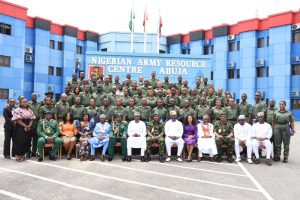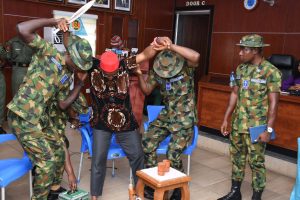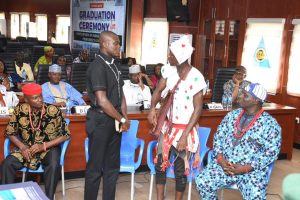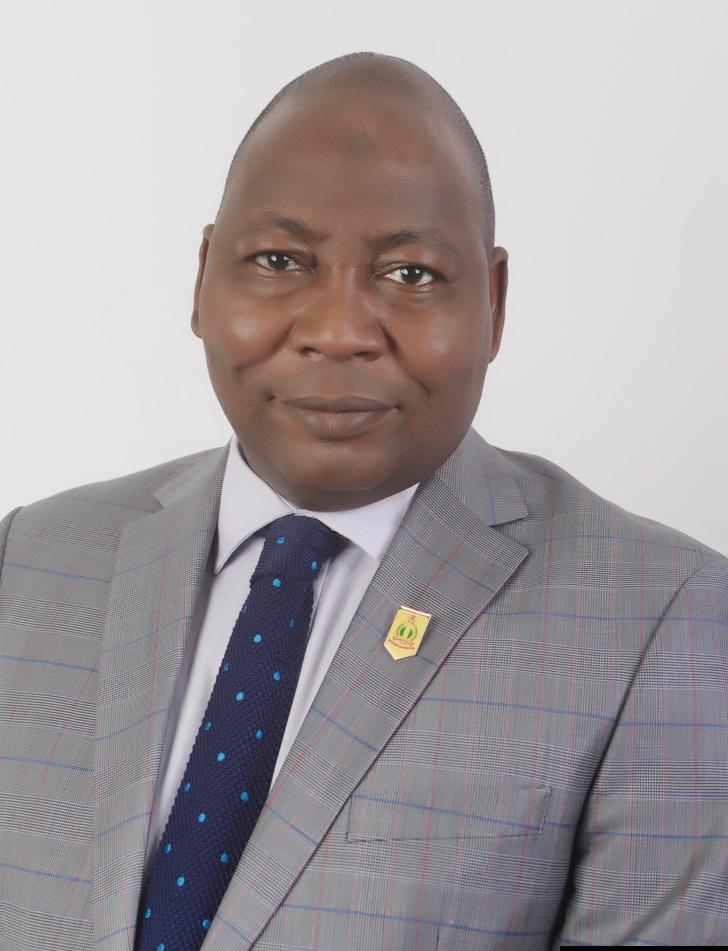


By Brigadier General Sani Kukasheka Usman (RTD), mni fnipr
“To have another language is to possess a second soul.”-Charlemagne
In a country as diverse and complex as Nigeria, language is more than just a medium of communication, it is a gateway to understanding, empathy and effective leadership. At a time when many are lamenting the widening ethnic, religious and cultural divides across the nation, the Nigerian Army has chosen a different path, one of unity through language and cultural integration.
The Nigerian Army Resource Centre (NARC), Abuja, marked yet another significant milestone on Friday, 9th May 2025, with the graduation of 150 officers and soldiers from across its various formations and units. These graduates of the Indigenous Languages Course 18/2025 represent the 18th group of personnel to complete this flagship initiative, which, since 2018, has equipped over 2,410 personnel that become proficient in two other languages other than their mother tongues in any of the 3 major Nigerian languages. Thus equipping them to serve not only as protectors of the nation, but also as bridges across its many divides and agents of national unity.
The course is the practical expression of the Nigerian Army Language Policy, which mandates that all personnel must learn at least two indigenous languages apart from their mother tongue. This is not a cosmetic requirement, but a strategic initiative of the Nigerian Army. In the multi-ethnic theatres of Nigeria Army’s counterinsurgency and internal security operations, whether in the Northeast, Northwest, South-South or other geo-political regions, managing community relations has compelled a proficiency in local languages as an important tool in operational effectiveness and mission success of the troops.
The programme is a brainchild of the forward-looking leadership of the Nigerian Army and the management of NARC, in partnership with Laclic Services Limited. It bears eloquent testimony to the evolving role of the military in ensuring law and order in the country. All thanks to this wonderful initiative, today’s soldier is not just a fighter, but also a negotiator, peacebuilder and communicator. Special commendation must go to Laclic Services Limited, the indigenous company that supplies well-trained instructors and high-quality teaching aids. The organisation’s dedication to linguistic excellence and cultural preservation has been central to the programme’s success.
Participants of the programme are immersed in both theoretical and practical learning. Classes include local culture, grammar, vocabulary, phonetics and conversational skills. The course curriculum also integrates photo stories, group work, presentations and rigorous written and oral assessments. One of the most impactful components is the practical field immersion, where trainees visit the nearby Mammy Market at Mambilla Barracks, interact with civilians in their chosen languages, and test their communication skills and proficiency in real-time. On graduation day, participants stage playlets, which are performed entirely in the new languages they’ve acquired. These dramatisations are more than ceremonial; they are symbolic of the bridge-building spirit the programme seeks to instil.
Across the world and here in Nigeria, there are countless examples of how language proficiency has changed the trajectory of military and humanitarian operations. In 2002–2003, during the United Nations Mission in Sierra Leone (UNAMSIL), Nigerian troops earned the admiration of local communities largely because some had taken time to learn Krio, the lingua franca. This linguistic empathy smoothed community engagements and de-escalated tensions. Similarly, in Liberia and Sudan, Nigerian peacekeepers’ knowledge of local languages often made the difference between suspicion and cooperation.
Contrast this with situations where language gaps exacerbate mistrust. During the early stages of the insurgency in Northeast Nigeria, numerous misunderstandings between troops and local communities were linked to poor communication. Civilians misinterpreted military movements and intentions, while troops, unable to decode local dialects or cultural nuances, struggled to build rapport. In several cases, critical intelligence from locals was lost in translation, if not missed altogether.
Outside the military, language differences have triggered or prolonged conflicts, particularly in multi-ethnic settings. A notable example is the 1994 Rwandan Genocide, where the inability to mediate between ethnic groups, compounded by poor communication, allowed propaganda and hate speech to go unchallenged. Even in advanced democracies, language barriers within immigrant or multi-ethnic communities continue to affect law enforcement, healthcare delivery and justice administration.
The Indigenous Languages Course demonstrates that language can be a powerful peacebuilding tool. It allows soldiers to interact with their colleagues, neighbours and host communities in their tongue, breaking down barriers, winning hearts and minds, and enabling more effective civil-military cooperation. It also enhances internal cohesion within the military, fostering mutual respect and unity across Nigeria’s ethnocultural spectrum.
This initiative is as much about national integration as it is about professional development. It empowers personnel to function better, not just on the battlefield, but in their everyday engagements with the very citizens they swore to defend. It reinforces the belief that to secure a nation, you must first understand it, and to understand it, you must speak its many tongues.
This programme undoubtedly stands as a model for other government agencies, institutions, and even private organisations, which can benefit from improved interethnic communication, stronger community engagement, and enhanced operational cohesion through indigenous language proficiency. If the military, an institution often associated with rigid hierarchy and combat discipline, can embrace linguistic diversity as a strength, then so can the rest of the country. We must move from mere tolerance to active appreciation of our differences. Language is where that journey begins.
As Nigeria continues to search for a unifying national identity, initiatives like the Indigenous Languages Course of the Nigerian Army offer a compelling blueprint. It reminds us that nation-building is not only the duty of politicians and intellectuals, but of every institution and indeed every citizen willing to take one more step towards understanding the other.
To further encourage participation, the Nigerian Army supports officers and soldiers who successfully graduate from the course with a monthly stipend. Additionally, to ensure continued proficiency and commitment, such personnel are tested annually, reinforcing both the seriousness of the initiative and its long-term impact. It is also important to highlight the annual online recertification examinations, which serve as a mechanism to ensure that participants continue to practice and retain the languages they have learned at the NARC. In addition, facilitators occasionally reach out to selected graduates at random, offering informal check-ins and gentle reminders to keep their linguistic skills active and relevant.
As the latest graduates take the stage at NARC, let us salute them, not just for their newfound language skills, but for becoming living symbols of Nigeria’s promise: that despite our differences, we can speak as one.
It is now time for all Nigerians, individuals, institutions, and governments at every level, to recognise, commend and emulate this remarkable initiative. Language should not divide us; it should connect us. Just as the Nigerian Army has shown leadership in bridging ethnic and cultural gaps through structured language education, so too should our schools, civil service, institutions and communities embrace multilingualism as a tool for national integration. Let this be a national movement that values every Nigerian tongue, culture, and effort to understand the other. By learning one another’s language, we take the first step toward learning one another’s pain, dreams, fears, and hopes.
Only then can we move beyond mere coexistence to truly live as one, bound not just by geography but by a shared commitment to peace, harmony, and mutual respect. Let us rise above our divisions and embrace the strength in our diversity, building a united Nigeria under God where every voice is heard, every culture is honoured, and every citizen belongs and is respected.
The writer, Brigadier General Sani Kukasheka Usman (rtd), mni fnipr, is a public affairs analyst and a specialist in security and strategic communication. He can be reached via his social media platforms using the handle @skusman.








